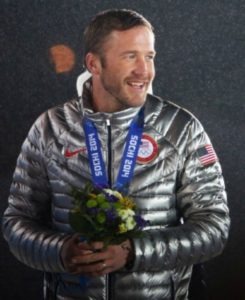 One day after this controversial interview, the question lingers: Was U.S. skier Bode Miller pushed too far Sunday in an NBC interview that kept probing his feelings regarding the death of his younger brother?
One day after this controversial interview, the question lingers: Was U.S. skier Bode Miller pushed too far Sunday in an NBC interview that kept probing his feelings regarding the death of his younger brother?
It was certainly an emotional moment even before Miller agreed to the interview with NBC’s Christin Cooper.
Miller had come up lacking in his two prior alpine skiing events at the Sochi Olympics. And it would have been strike three had he failed to reach the podium Sunday in the super-G.
But Miller delivered a very solid effort that was good enough to tie for a bronze medal. It was the sixth Winter Olympics medal for the 36-year-old Miller, who became the oldest medalist in Olympic alpine skiing history.
Miller savored the moment a while with his wife at the bottom of the super-G hill, then came an interview with Cooper, a former Olympic skier herself, now turned “sideline” reporter.
It didn’t take long for Cooper to hit a raw, emotional nerve with Miller: the death of his younger brother Chelone.
Chelone “Chilly” Miller, a competitive snowboarder known for his progressive style, was found dead in his van from a seizure in April 2013.
The camera zoomed in for a very close up shot of Miller as he spoke with Cooper.
Cooper: Bode, you’re showing so much emotion down here. What’s going through your mind?
Miller: (after a long pause) A lot, obviously. A long struggle coming in here. And, uh, just a tough year.
Cooper: I know you wanted to be here with Chilly experiencing these games, how much does it mean to you to come up with a great performance for him? And was it for him?
Miller: I mean, I don’t know it’s really for him. But I wanted to come here and uh – I don’t know, I guess make myself proud.
As Miller began to tear up, Cooper kept up the questioning.
Cooper: When you’re looking up in the sky at the start, we see you there and it just looks like you are talking to somebody. What’s going on there?
This time no answer came back from Miller, who instead found refuge against a fence that separated him from Cooper.
Cooper could be heard whispering – “sorry” – and put her hand on Miller’s shoulder before he walked away a few seconds later.
Although Cooper was almost immediately being blasted by media members and on social media worldwide, did the interview really push the limit? The answer here is no.
Cooper did what many other reporters would have done in the same situation. She gently asked questions that frankly everyone probably wanted to hear from Miller, who is typically not very revealing personally during interviews.
A day later, Miller wasn’t chastising Cooper, he was defending her.
Miller told angry viewers to be “gentle” with Cooper. On Twitter, he wrote – “I appreciate everyone sticking up for me. Please be gentle w christin cooper, it was crazy emotional and not all her fault.”
Prior to Sunday’s race, NBC had made Miller’s story regarding his deceased brother a big part of its coverage. Miller even spoke about his brother with Tom Brokaw one day prior to the super-G. And NBC aired a heartfelt feature segment on the Miller brothers prior to Bode’s super-G run.
Yet Associated Press media writer David Bauder called the Cooper interview a “shameful spectacle,” and added, “It was tone-deaf and cruel, and short-circuited the thoughtful, intelligent perspectives Miller had started to offer until he couldn’t talk anymore.”
Richard Sandomir, a reporter with the New York Times agreed. “Cooper and NBC lacked the sensitivity to know when enough was enough,” wrote Sandomir.
Taking note of all the criticism, NBC issued a statement, defending the interview.
“Our intent was to convey the emotion that Bode Miller was feeling after winning his bronze medal. We understand how some viewers thought the line of questioning went too far, but it was our judgment that his answers were a necessary part of the story. We’re gratified that Bode has been publicly supportive of Christin Cooper and the overall interview.”
This is 2014 and life in the media fishbowl often results in probing, regardless of the subject. In the case of Miller, he didn’t get pushed too hard by Cooper. She was doing what most good reporters often do: their job.